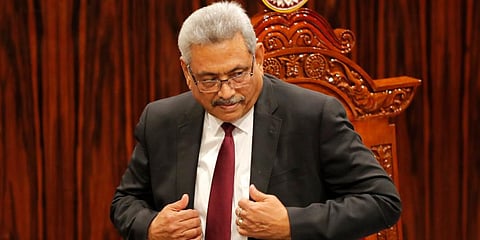

COLOMBO: Sri Lankan election commission has urged all political parties to come together to form an all-party government or a similar body to end the political impasse prevailing in the country, amidst fierce public protests demanding the resignation of President Gotabaya Rajapaksa for mishandling the country's worst economic crisis.
Debt-ridden Sri Lanka is grappling with an unprecedented economic turmoil since its independence from Britain in 1948.
The crisis is caused in part by a lack of foreign currency, which has meant that the country cannot afford to pay for imports of staple foods and fuel, leading to acute shortages and very high prices.
"It is the view of the election commission that an all-party cabinet or a similar body must set up an interim government," said Commissioner General of Elections Saman Sri Ratnayake.
The election commission advocates constitutional reform be implemented within a specific time frame and the creation of special ministries to gain foreign exchange and to provide essential services to the public.
It also calls for legislation to allow electronic voting with restrictions on political parties for election spending.
President Rajapaksa is coming under increasing pressure to set up an interim administration as an immediate step to resolve the economic and political turmoil in the country.
Mass anti-government protests demanding the resignation of the entire Rajapaksa family have been going on for more than two weeks.
President Rajapaksa has said he would hand over the government to any group that could muster 113 seats in the 225-member Parliament but would not step down from the presidency.
His brother and Prime Minister Mahinda Rajapaksa also stressed last week that there was no need for him to resign or to allow the formation of an interim government without his leadership.
In his bid to stave off resignation pressure, the prime minister on Tuesday met the local council members of the ruling SLPP coalition.
They urged Rajapaksa to continue as the prime minister.
In recent weeks, prominent businesses and other professional organisations have repeated the call for an interim government.
A senior Buddhist monk claimed on Monday that President Rajapaksa had agreed to form an interim government to tackle the unprecedented economic crisis.
Rajapaksa has said his offer for the opposition parties to join him in a unity government did not yield any results and therefore he was compelled to form a cabinet of his own.
The ongoing street protest opposite the presidential secretariat entered its seventeenth day on Tuesday.
The protesters demand the resignation of the president and his elder brother who is the prime minister.
The ruling dispensation had reached out to the opposition parties and protesters for talks, but all efforts were rebuffed with agitators saying they want the government to resign.
A group of over 40 parliamentarians from the ruling coalition has declared independence and demanded the formation of an interim government comprising all political parties to tackle the economic crisis.
Sri Lanka needs at least USD 4 billion to tide over its mounting economic woes, and talks with international institutions such as the World Bank as well as countries like China and Japan for financial assistance have been going on.
Sri Lankan officials were in Washington last week to negotiate with the International Monetary Fund for a bailout.
India has agreed to extend an additional USD 500 million credit line to help Sri Lanka import fuel.
New Delhi has also already agreed to defer USD 1.5 billion in import payments that Sri Lanka needs to make to the Asian Clearing Union.
Last week, the Sri Lankan government said it would temporarily default on USD 35.5 billion in foreign debt as the pandemic and the war in Ukraine made it impossible to make payments to overseas creditors.